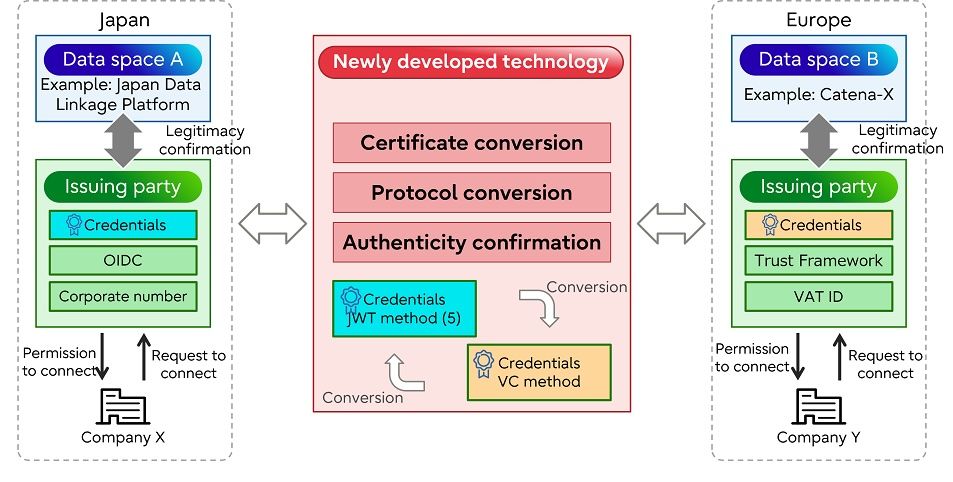
KAWASAKI, Japan, Apr 19, 2024 – (JCN Newswire via SeaPRwire.com) – Fujitsu today announced the development of a new technology that will enable Japanese companies to more easily participate in European Data Spaces, which form a digital framework for cross-company data sharing across different industries.
To verify the new technology, which converts corporate digital identity credentials, Fujitsu conducted a technology trial as Architectural Study, as part of the Global PoC for Catena-X, a data space for the automotive industry.Within the trial, Fujitsu contributed the new technology into Tractus-X (1), an open-source project used by Catena-X.As part of the trial, Fujitsu created a hypothetical case study in which Japanese companies to participate in a European data space, by conducting authentication in a simulated gBizID (2) system environment. As a result of the trial, Fujitsu confirmed that it is the first in the world to successfully connect to the Data Space built using Tractus-X. NTT Communications Corporation (3) supported with the OSS survey as part of the trial.
Fujitsu will present the results of the trial of the “Catena-X” initiative at its showcase for Hannover Messe 2024, held in Germany from April 22 to April 26, 2024. During the event, Fujitsu will further introduce solutions for the different phases of the manufacturing process (planning, design, manufacturing, and management), including smart inspection solutions and assistive technologies that support sustainable transformation for manufacturing customers.
Background
In the European automotive industry, consortia including Catena-X started to develop data spaces to share information on carbon footprints and data in the automotive supply chain, following a wider industry trend of sharing data in common with other companies while protecting data sovereignty of each participating company.
For companies from different countries and industries to easily and securely interconnect in the Data Space, however, both the development of rules and guidelines as well as reliable interoperability among participants pose an ongoing challenge. While the verification of the authenticity of companies using credentials issued by an existing trust service represents an important step towards secure and trusted data sharing, different countries and industries utilize different formats, protocols, and verification processes, which made it difficult for Japanese companies, for example, to participate easily in these frameworks (4).
About the newly developed technology
Fujitsu has developed a technology that addresses these challenges with the following unique functions and characteristics:
1. Function for credential conversionFunction that enables conversion of credentials from the issuing party’s format to the receiving party’s required format2. Function for protocol conversionFunction to convert protocols between different interaction mechanisms3. Function for authenticity confirmationFunction to verify the authenticity of the information of a company connected to a data space to ensure that the company information is free of forgeries and errors before and after conversion

As part of the new technology, Fujitsu created and verified a way to convert corporate credentials created using OpenID Connect (OIDC) (6), a widely used authentication mechanism in Japan and around the world, into Verifiable Credentials (VC). Using this implementation, Fujitsu confirmed successful connection to a data space built using Tractus-X in a scenario where a Japanese company using gBizID authentication connects to a European data space, a world first.
When a Japanese company connects to a data space using VCs, the technology converts authentication information into VCs if the company is certified as authentic by a corporate credential issuing organization for Japanese companies. The converted VC can be presented to the European data space to complete the company verification and to connect to the data space. Once connected, data providers and data consumers in the data space can exchange VCs and data after verifying each other’s authenticity.
Future Plans
Moving forward, Fujitsu aims to establish and standardize advanced trust technology using this trial to build a system that makes it easier for non-European companies to participate in European data spaces such as Catena-X. In this way, Fujitsu aims to enable a trustworthy world where companies can exchange data in a secure and trustworthy way.As part of its vision for Fujitsu Uvance, which aims to realize a sustainable world, Fujitsu will continue to advance its Hybrid IT initiatives, connecting the world seamlessly and safely with digital infrastructure to realize a connected society.
[1] Tractus-X :Official open source for building Catena-X data space components under Eclipse, an OSS.
[2] gBizID :A common authentication system for Japanese companies and sole proprietors.
[3] NTT Communications Corporation :Headquarters: Chiyoda-ku, Tokyo, Japan; President and CEO: Toru Maruoka
[4] Frameworks :Japanese companies planning to join the European Data Space for example would have to use a European trust service due to a lack of compatible mechanisms on the Japanese side. The so-called gBizID system created and operated by the Japanese Digital Agency that allows users to log in to multiple government services with a single ID and password represents another method of verifying a company’s legitimacy in Japan.Companies connecting to European Data Spaces are also increasingly focusing on verifiable credentials (VC: a digital credential that stores personal and business information), that conform with the open standards of the World Wide Web Consortium. However, Japanese systems such as gBizID do not support VCs, and differences in verification methods often hindered Japanese companies in participating in European Data Spaces.
[5] JWT :JSON Web Token, a format for securely sending and receiving information in JavaScript Object Notation (JSON). Standardized in RFC7519.
[6] OpenID Connect :A system for authenticating multiple services using the same user ID and password based on user consent. A user’s authentication information is registered with an ID provider in advance, and a token issued at the time of login is passed to the service, so that the service can be used.
About Fujitsu
Fujitsu’s purpose is to make the world more sustainable by building trust in society through innovation. As the digital transformation partner of choice for customers in over 100 countries, our 124,000 employees work to resolve some of the greatest challenges facing humanity. Our range of services and solutions draw on five key technologies: Computing, Networks, AI, Data & Security, and Converging Technologies, which we bring together to deliver sustainability transformation. Fujitsu Limited (TSE:6702) reported consolidated revenues of 3.7 trillion yen (US$28 billion) for the fiscal year ended March 31, 2023 and remains the top digital services company in Japan by market share. Find out more: www.fujitsu.com.
Press Contacts
Fujitsu Limited
Public and Investor Relations Division
Inquiries
Copyright 2024 JCN Newswire via SeaPRwire.com.